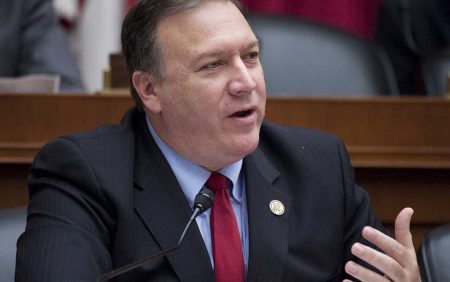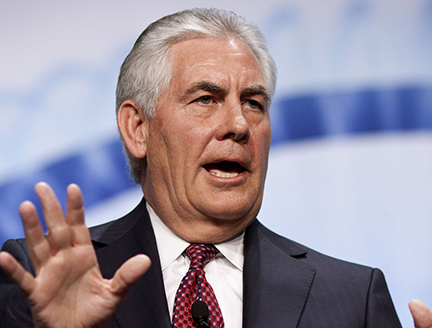WASHINGTON, (Reuters) – U.S. President Donald Trump fired Secretary of State Rex Tillerson yesterday after a series of public rifts over policy on North Korea, Russia and Iran, replacing his chief diplomat with loyalist CIA Director Mike Pompeo.
The biggest shakeup of Trump’s Cabinet since he took office in January 2017 was announced by the president on Twitter as his administration works toward a potential meeting with North Korean leader Kim Jong Un after months of harsh rhetoric and rising tensions on Pyongyang’s nuclear program.
The rare firing of the United States’ top diplomat capped months of friction between the Republican president and the 65-year-old former Exxon Mobil Corp chief executive. The tensions peaked last fall amid reports Tillerson had called Trump a “moron” and considered resigning. Tillerson never denied using the word.
Critics expressed dismay at the decision to swap out top diplomats so soon before the unprecedented meeting and worried that Pompeo would encourage Trump to scrap the 2015 Iran nuclear deal and be hawkish on North Korea.
Critics said the move would sow more instability in the volatile Trump administration and marks the departure of another moderate who sought to emphasize the United States’ strong ties to its allies amid Trump’s criticism.
Trump announced the changes in a morning Twitter post and later told reporters more about why he removed Tillerson.

“We got along actually quite well but we disagreed on things,” Trump said. “When you look at the Iran deal: I think it’s terrible, I guess he thinks it was OK. I wanted to break it or do something, and he felt a little bit differently.”
At the State Department, a visibly emotional Tillerson said Trump called him around noon from Air Force One, hours after he was summarily dismissed via Twitter. Tillerson also spoke with White House Chief of Staff John Kelly.
He said his tenure ends on March 31 but he would delegate his responsibilities to John Sullivan, deputy secretary of state, at the end of Tuesday.
“What is most important is to ensure an orderly and smooth transition during a time that the country continues to face significant policy and national security challenges,” Tillerson, whose voice quivered at times, told reporters in a packed briefing room.
He pointedly declined to thank Trump personally or praise him, as he has done on previous occasions, but emphasized his strong relationship with Secretary of Defense Jim Mattis. Together, the two were seen as a moderating influence on some of Trump’s policies.
However, Tillerson, also presided over a State Department which saw its role vastly diminished, with several high-profile posts unoccupied and many allies questioning the efficacy of dealing with a diplomat they suspected never had Trump’s ear.
In contrast, Trump said he and Pompeo have “a similar thought process.”
Pompeo, a former Army officer who represented a Kansas district in the House of Repre-sentatives before taking the Central Intelligence Agency job, is seen as a Trump loyalist who has enjoyed a less hostile relationship with career spies than Tillerson had with career diplomats.
Trump chose the CIA’s deputy director, Gina Haspel, to replace Pompeo there. A veteran CIA clandestine officer, Haspel is backed by many in the U.S. intelligence community but is regarded warily by some in Congress for her involvement in the agency’s “black site” detention facilities.
Senior White House officials said Trump wanted his new team in place before any summit with Kim, who invited the U.S. president to meet by May after months of escalating tensions over North Korea’s nuclear and missile programs.
Tillerson listed several foreign policy objectives Washington was working on and singled out Russia for its “troubling behavior and actions.”
Stocks were lower in the afternoon, shaking off early gains on data showing slowing consumer price inflation, on uncertainty about Tillerson’s dismissal and replacement by Pompeo.
“Pompeo is known to be a real hawk on trade and foreign policy,” said Jim Awad, senior managing director at Hartland & Co in New York. “There’s nobody to be a check and balance on Trump. It’s been unsettling to the market within the context of what we see now in the economy, which is a favorable backdrop.”
Tillerson’s imminent departure had been rumored for several months, and Trump said he and Tillerson had discussed the move. State Department officials said Tillerson did not know why he was being pushed out and had intended to stay. One of them, Steven Golstein, was fired later on Tuesday, after he contradicted the White House’s version.
Foreign policy experts from Republican and Democratic administrations also questioned Trump’s timing and choice, noting that Pompeo was known as a political partisan with hawkish views.
Evans Revere, a former senior U.S. diplomat who dealt with North Korea under President George W. Bush, said Trump’s move sends “a bad signal about the role of diplomacy.”
“Tillerson’s replacement by … Pompeo, who is known as a political partisan and an opponent of the Iran agreement, raises the prospect of the collapse of that deal, and increases the possibility that the administration might soon face not one, but two nuclear crises,” he said.
Senior White House officials said Chief of Staff Kelly had asked Tillerson to step down on Friday but did not want to make it public while he was on a trip to Africa. Trump’s Twitter announcement came only a few hours after Tillerson, who cut his trip to Africa short, landed in Washington.
Tillerson appeared to be caught by surprise last week when Trump announced he had accepted Kim’s invitation to meet.
Tillerson joined a long list of senior officials who have either resigned or been fired since Trump took office.
Trump publicly undercut Tillerson’s diplomatic initiatives numerous times.
Last year Tillerson said the United States was directly communicating with North Korea but that Pyongyang had shown no interest in dialogue. Trump contradicted Tillerson’s efforts a day later.
“I told Rex Tillerson, our wonderful Secretary of State, that he is wasting his time trying to negotiate with Little Rocket Man,” Trump wrote on Twitter, using a pejorative nickname for Kim.
Tillerson and Mattis had pressed a skeptical Trump to stick with the nuclear agreement with Iran and other world powers, and Tillerson has taken a more hawkish view than Trump on Russia.
Tillerson had emerged as a vocal critic on Russia – for its role in the annexation of Crimea, support for Syrian President Bashar al-Assad and alleged meddling in the U.S. election. He also singled out Russia for its apparent role in the Soviet-era nerve weapon used to poison a former Russian double agent in Britain – a position that initially diverged from the White House.
If confirmed by the U.S. Senate after an April committee hearing, Pompeo will be taking over a State Department shaken by the departures of many senior diplomats and embittered by proposed budget cuts.
Lawmakers from both major parties have criticized those cuts and the administration’s failure to fill dozens of open jobs there. But over time, many lawmakers grew to appreciate Tillerson as a relatively steady hand in the chaotic Trump administration.
“I’ve talked to the president many, many times and I know Secretary Tillerson. I’m very aware of the relationship,” said Senate Foreign Relations Committee Chairman Bob Corker, a Republican. “And as I’ve mentioned publicly, I thought there was a reprieve that was under way since about the beginning of December, but, look.”
Tillerson said he would now return to private life.









